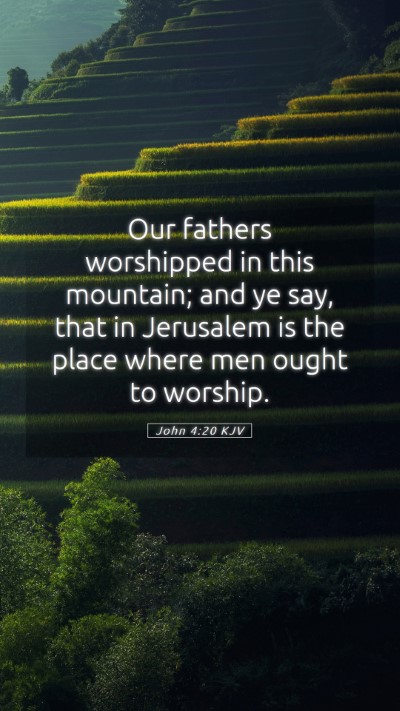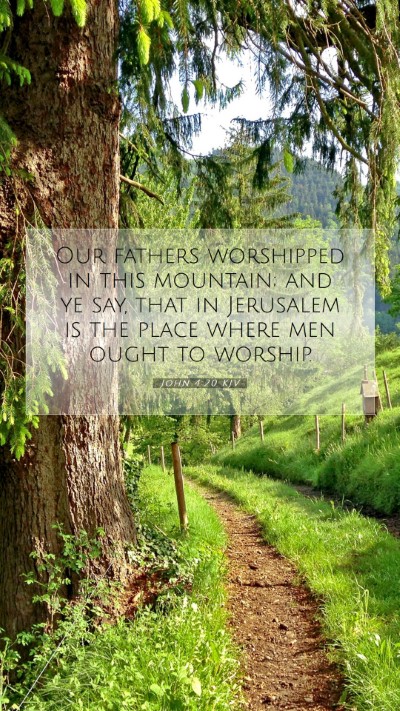Understanding John 4:20
In John 4:20, we encounter a profound discourse between Jesus and the Samaritan woman at the well. This interaction not only reveals the nature of true worship but also emphasizes the significance of spiritual understanding over physical locations of worship.
Bible Verse
“Our fathers worshiped in this mountain; and ye say, that in Jerusalem is the place where men ought to worship.” (John 4:20)
Bible Verse Commentary
Insights from Matthew Henry
Matthew Henry provides insightful commentary on this verse, emphasizing the historical context of worship among the Jews and Samaritans. He notes that the woman references the traditional worship of her ancestors on Mount Gerizim, contrasting it with the Jewish practice centered in Jerusalem.
Albert Barnes' Analysis
Albert Barnes explains that this verse illustrates the confusion surrounding the proper place of worship. He underscores that the Samaritan woman's question reflects a broader debate about worship and the location's significance, illustrating her desire for clarity and truth in spiritual matters.
Adam Clarke's Interpretation
Adam Clarke delves into the theological implications of this dialogue. He highlights the woman's recognition of a spiritual heritage that conflicts with the Jewish understanding, pointing towards the transitions in worship that Jesus later elucidates, indicating a move away from physical locations to a more profound spiritual connection.
Key Themes and Analysis
This verse is pivotal for understanding the transition in worship practices that Jesus emphasizes throughout His ministry. The key themes include:
- Historical Context: The contrasting worship practices of the Samaritans and Jews highlight cultural and theological divides.
- True Worship: Jesus' subsequent teachings (not covered in this verse) shift the focus from physical locations to spiritual sincerity.
- Spiritual Identity: The dialogue reflects the identity crises faced by both the Samaritan and Jewish people regarding their relationship with God.
In-Depth Bible Verse Analysis
When we consider the verse in conjunction with surrounding passages, John 4:20 serves as a launching point for understanding how Jesus redefines worship. It's essential for:
- Understanding Difficult Bible Passages: This verse epitomizes many challenges in interpreting historical contexts within Scripture.
- Applying Bible Verses to Daily Life: It invites believers to reflect on their personal practices of worship beyond physical actions.
- Historical Context of Bible Verses: Awareness of the Samaritan and Jewish tensions provides a clearer view of Jesus' revolutionary message.
Significance of John 4:20
This verse opens a door to understanding the heart of Jesus' ministry. The focus is not solely on where worship occurs but on the very nature of worship itself. Key takeaways include:
- Worship in Spirit and Truth: The implied message points toward an internal, heart-driven faith rather than simply adhering to traditions.
- Inclusivity of Worship: Jesus’ discourse hints at a more inclusive approach to worship that transcends geographical and cultural barriers.
- Spiritual Awakening: The acknowledgment of worship practices reflects a greater call to recognize one's spiritual need for the living God.
Cross References
John 4:20 is connected to several other biblical references that illuminate its message:
- Deuteronomy 11:29: Acknowledgment of the blessings associated with worship in designated places.
- Psalm 27:4: A desire to dwell in the house of the Lord, reflecting the longing of spirituality over tradition.
- John 4:24: Jesus' clarifying statement that God seeks worshippers who worship in spirit and truth.
- Luke 19:46: Jesus' actions in cleansing the temple reflect His desire for a deeper understanding of worship.
- Hebrews 12:28-29: Encouraging believers to receive a kingdom that cannot be shaken, emphasizing heart and spirit in worship.
Conclusion
John 4:20 stands as a critical text for studying the nature of worship. It provides profound insights into how the approach to God must evolve from location-driven practices to an inward, spirit-led connection. Through this understanding, believers are challenged to reflect on their approach to God, away from mere rituals and towards genuine, heartfelt worship.


